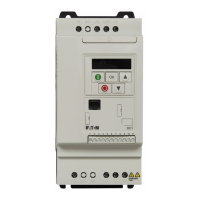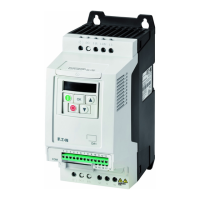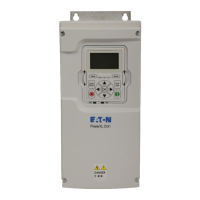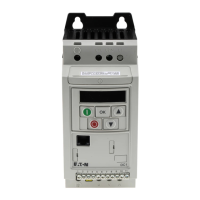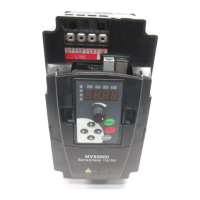2 Engineering
2.4 Safety and switching
40 DC1 Variable Frequency Drive 04/16 MN04020003Z-EN www.eaton.com
A symmetrical, fully screened (360°), low-impedance motor cable must be
used. The length of the motor cable depends on the RFI class and the
environment.
For US installations, UL-listed cables (AWG) should be used exclusively.
These cables must have a temperature rating of 70 °C (158 °F), and will often
require installation inside a metal conduit (please consult the applicable local
standards).
2.4 Safety and switching
2.4.1 Disconnecting device
In the European Union, this disconnecting device must be one of the
following devices in order to comply with European Directives as per
standard EN 60204-1, “Safety of machinery”:
• An AC-23B utilization category disconnector (EN 60947-3)
• A disconnector with an auxiliary contact that in all cases will disconnect
the load circuit before the disconnector’s main contacts open
(EN 60947-3)
• A circuit-breaker designed to disconnect the circuit as per EN 60947-2
In all other regions, the applicable national and local safety regulations must
be complied with.
2.4.2 Fuses
The DC1 variable frequency drive and the corresponding supply cables must
be protected from thermal overload and short-circuits.
The fuses will protect the supply cable in the event of a short-circuit, limit any
damage to the variable frequency drive, and prevent damage to upstream
devices in the event of a short-circuit in the variable frequency drive.
→
For the rated cable cross-sectional areas for DC1 variable
frequency drives, please refer to Section 6.4, “Cable cross-
sections“, page 143.
→
Install a manual disconnecting device between the mains
connection and the DC1 variable frequency drive.
This disconnecting device must be designed in such a way that
it can be interlocked in its open position for installation and
maintenance work.
→
The fuse ratings and cable cross-sectional areas (wire gauges)
for the connection on the mains side will depend on the DC1
variable frequency drive’s input current I
LN
.
→
For the recommended fuse sizing and assignments, please
refer to Section 6.5, “Fuses“, page 145.

